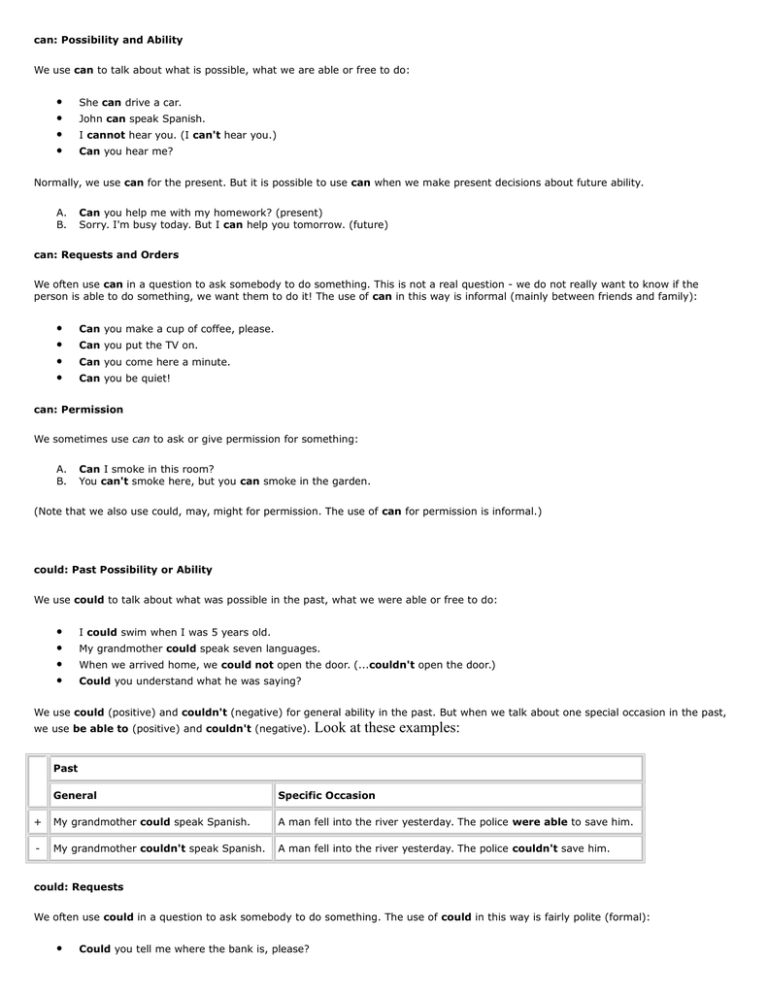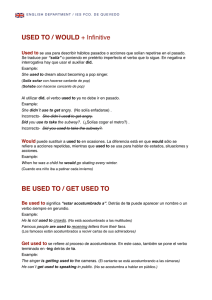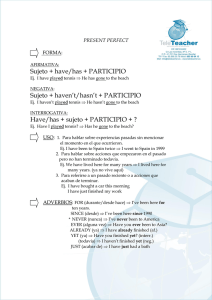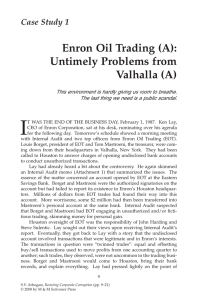can: Possibility and Ability
Anuncio

can: Possibility and Ability We use can to talk about what is possible, what we are able or free to do: She can drive a car. John can speak Spanish. I cannot hear you. (I can't hear you.) Can you hear me? Normally, we use can for the present. But it is possible to use can when we make present decisions about future ability. A. B. Can you help me with my homework? (present) Sorry. I'm busy today. But I can help you tomorrow. (future) can: Requests and Orders We often use can in a question to ask somebody to do something. This is not a real question - we do not really want to know if the person is able to do something, we want them to do it! The use of can in this way is informal (mainly between friends and family): Can you make a cup of coffee, please. Can you put the TV on. Can you come here a minute. Can you be quiet! can: Permission We sometimes use can to ask or give permission for something: A. B. Can I smoke in this room? You can't smoke here, but you can smoke in the garden. (Note that we also use could, may, might for permission. The use of can for permission is informal.) could: Past Possibility or Ability We use could to talk about what was possible in the past, what we were able or free to do: I could swim when I was 5 years old. My grandmother could speak seven languages. When we arrived home, we could not open the door. (...couldn't open the door.) Could you understand what he was saying? We use could (positive) and couldn't (negative) for general ability in the past. But when we talk about one special occasion in the past, we use be able to (positive) and couldn't (negative). Look at these examples: Past General Specific Occasion + My grandmother could speak Spanish. A man fell into the river yesterday. The police were able to save him. - My grandmother couldn't speak Spanish. A man fell into the river yesterday. The police couldn't save him. could: Requests We often use could in a question to ask somebody to do something. The use of could in this way is fairly polite (formal): Could you tell me where the bank is, please? Could you send me a catalogue, please? 1 2 3 4 5 6 7 8 9 10 he understand what you were talking about? My sister play tennis now. I walk when I was less than a year old. (Polite) you tell me what time it is, please? My grandfather walk without any help last night. I would like to play the piano. How long have you drive? I'll help you later. Can you help me? I never understand this. Will Man live forever one day? Cuando se usa needn't significa que no es necesario hacer algo. Cuando se usa didn't need to significa que no has hecho la acción porque no era necesario. Cuando se usa needn't have significa que has hecho la acción aunque no fue necesario. Ejemplos: You needn't arrive early. No hace falta que llegues temprano. I didn't need to arrive early. Yo no tenia que llegar tan temprano. I needn't have arrived so early. No tenia que haber llegado tan temprano. 1. I 2. I 3. Sheila 4. Oh Mike, you (go) to work today but I went as I knew they were really busy on this new contract. (take) any money to the museum - I didn't realise it was free to enter. (got) a taxi to the party. I would have given her a lift in my car. (buy) me anything for my birthday! A simple card would have been perfectly acceptable. 5. Today was the last day of school and we (attend) classes in the afternoon. 6. We went for a lovely walk in the woods yesterday. We took a huge picnic with us but there was a café there anyway. We (take) anything! 7. Our boss told us we had an extra three days to finish the project so we 8. You (work) so hard. (say) anything to Carla about the broken vase. She understood what had happened anyway. Lie - lay - laid - lain (diferencias) Para saber distinguir entre "lie" y "lay" hay que tener en cuenta no solo los significados y usos, sino también si vas a usar estos verbos en presente, o en pasado. Por esta razón, los angloparlantes también se hacen un lío y frecuentemente utilizan estos dos verbos de manera incorrecta. Veamos, a continuación, si logramos aclarar estas diferencias. 1. Significados She lies on her couch every day. Se tumba en el sofá todos los días. Lie /lai/ (haz clic en la palabra para saber cómo suena) significa: tumbarse y yacer (también puede significar "mentir", pero de este significado no hablaremos porque no presenta problemas). Ejemplo: She lies on her couch every day. Ella se tumba en el sofá todos los días. He lays the cup on his desk every day. Él coloca la taza sobre la mesa todos los días. Lay /lei/ (haz clic en la palabra para saber cómo suena) significa: colocar, poner, extender. Ejemplo: He lays the cup on his desk every day. Él coloca la taza sobre la mesa todos los días. 2. Diferencia entre ambos verbos Además, de que los significados son diferentes "lie" NO necesita un objeto directo para tener sentido; "lay". en cambio, sí lo necesita. ¿Qué quiero decir con esto? Quiero decir que puedo usar "lie" sin añadir necesidad un objeto a continuación del verbo. En cambio, con "lay", necesito poner un objeto porque si no lo hago, la oración carece de sentido. Por ejemplo, puedo decir: They lie = Ellos se tumban. Pero, no puedo hacer lo mismo con "lay" y decir: "They lay" ="Ellos colocan", sin añadir el qué. Debo decir, por ejemplo, "They lay all the cards on the table". Ellos ponen todas las cartas sobre la mesa. Nota: Detrás de "lay" pongo "all the cards" todas las cartas, ese es el objeto directo. Esto es igual en español con el verbo "colocar". Siempre debo decir "qué" coloco "sobre la mesa, o donde sea," para que la oración tenga sentido. Cuál es la confusión La confusión entre ambos verbos se origina por la forma en que se conjugan estos verbos. El verbo "lay" en infinitivo (y presente) es exactamente igual que el pasado de "lie". Ambos son: "lay". Mira la siguiente tabla para tener una idea más clara. Infinitivo Lie (tumbarse) Lay (Colocar) Pasado Lay (tumbé) Laid (coloqué) Participio pasado Lain (tumbado) Laid (colocado) Veamos ejemplos: Pasado de "lie" Ayer me tumbé en el sofá. I lay (paste tense "lie") on the couch yesterday. Pasado de "lay" Ayer coloqué mi libro sobre tu mesa. I laid (past tense "lay") my book on your table yesterday. Participio pasado de "lie" Me he tumbado en el sofá. I have lain on the couch. Participio pasado de "lay".He colocado mi libro sobre tu mesa. I have laid my book on your table.. Para recordar: Mira las imágenes que he puesto más arriba."lie" yacer, tumbarse. "Lay" colocar, poner. El pasado de "lie" es igual que el verbo "lay" en infinitivo. Rise es un verbo irregular (rise-rose-risen) que quiere decir aumentar, incrementar, crecer o moverse hacia arriba. No acepta complementos. Así que algo o alguien rises, pero nunca rises a otra cosa o persona. The sun rises in the east. El sol sale por el este. 2010 air traffic figures are slowly rising after the crisis. Las cifras del tráfico aéreo del 2010 están creciendo poco a poco después de la crisis. Raise, por otro lado, es un verbo regular (raise-raised-raised) que tiene algo que ver con el significado del verbo anterior pues significa levantar, hacer, crecer, cultivar. Este verbo sí acepta complementos. Así que funciona al revés que rise, algo o alguien raises a algo o a alguien. She raised her hand to answer the question. Ella levantó su mano para responder la pregunta. Margaret raises her voice when she gets angry. Magaret alza la voz cuando se enfada. Araise es similar al verbo rise, es irregular (arise, arose, arisen). Significa levantar(se), salir a la luz, surgir, aparecer y sobre todo se usa en sentido figurado o abstracto para demostrar un levantamiento como respuesta o reacción a algo o alguien o la aparición de un fenómeno que hasta ese momento no se había manifestado. También se usa para que una persona se ponga en pie. The question of low salaries will arise during the meeting. La cuestión de los bajos salarios saldrá a colación durante la reunión. If the opportunity arises, I will travel to Cuba next year. Si se da la oportunidad, viajaré a Cuba el año que viene. A problem has arisen with your proposal. Ha surgido un problema con tu propuesta. Arise, Sir Edwards! ¡Levántate, Sir Edwards! 1. 2. 3. 4. 5. 6. 7. 8. 9. 10. 11. 12. The government are VAT (value added tax) to 20% next year. An unexpected problem has and so we have had to cancel the meeting. Suddenly the mist that had hidden the canyon and we had a most spectacular view. Prices have again due to the recent increase in inflation. Are there any matters from the minutes (written record) of the last meeting? My parents are farmers and chickens and pigs. I was born and on a farm, so I know all about animals. She from her chair and went over to the window. I would love to work in Africa should the opportunity . University entry requirements have sharply over the last decade. The directors have announced they are employee salaries across the board. After a cold morning temperatures should in the afternoon.






